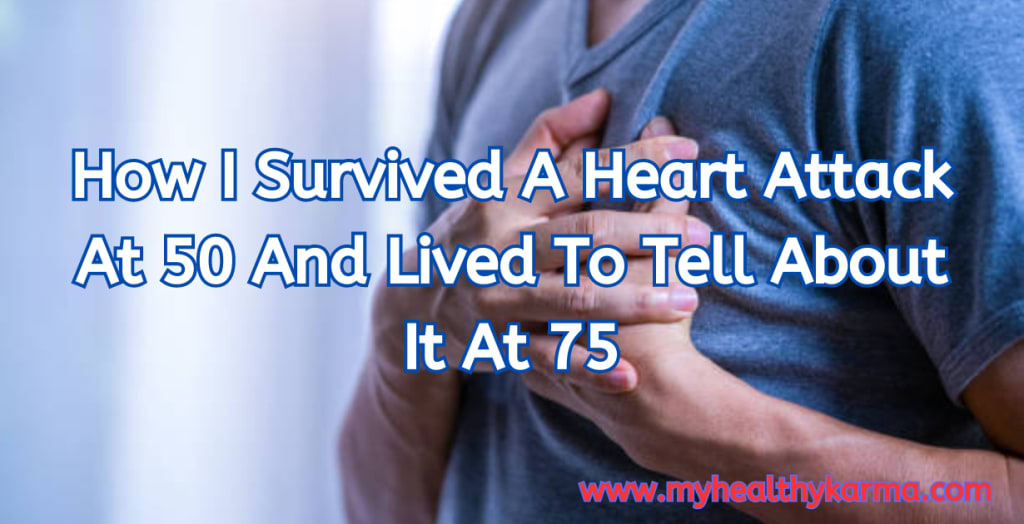How I Survived A Heart Attack At 50 And Lived To Tell About It At 75
This is one day that I cannot forget. Even after 25 years, this incident remains as fresh as the fragrance of a new flower. I clearly remember that fateful Monday morning with vivid clarity even today.

HOW I SURVIVED A HEART ATTACK AT 50 AND LIVED TO TELL THE STORY AT 75
This is one day that I cannot forget. Even though 25 years have passed, this incident remains as fresh as the fragrance of a new flower. I clearly remember that fateful Monday morning with vivid clarity, even today.
Having gotten up with a hangover from the weekend blast that I had at the bar with my friends, I was already late for work. Gobbling up my breakfast, I headed straight for the door, looking at my watch, I started cursing myself.
It was my turn to take the car-pool to work. The freeway would be choc-a-block with traffic on Monday morning as the rush hour had already started. And New York is well known for its traffic.
Having picked up my colleagues, we headed straight for the freeway, and being a warm summer day, the weather forecast on the local FM network predicted a warm and sunny day with traffic with heavy traffic and detours.
Things were going well until suddenly there was darkness around my eyes and the next thing that I could remember was…the excruciating pain the moment I tried to wake up to go the bathroom, a voice suddenly told me that I am not allowed to leave my bed and that I would be given a bed pan.
Looking around, I was in the ICU of a hospital! It is 3 am in the morning and after having relieved myself, I was unable to sleep. The pain in my body made it really uncomfortable for me to sleep on my sides, as it is my normal habit.
The doctor on duty came for his usual rounds and informed me that I had suffered a severe heart attack and that I had to be rushed to the ICU of the hospital for monitoring. A heart attack? At the age of 50? Impossible!
How did I suffer a heart attack without any effects?

I had experienced a silent heart attack. When a silent heart attack occurs, there are usually few, if any, of the common symptoms. This may occur due to a minor injury to the heart muscles.
The doctor explained that a silent heart attack, known as a silent Myocardial Infarction (MI), in medical terms, is a heart attack that occurs without the typical symptoms, such as chest pain or discomfort.
It is called "silent" because the individual may not even be aware that they are having a heart attack. For me, the only thing that I could recollect was that I had collapsed on the steering wheel!
There have been several known causes that have been listed for a silent heart attack, including:
Diabetes: Severe diabetics often suffer nerve damage that can affect their ability to feel pain or discomfort, leading to a silent heart attack, as they are not able to feel the pain in the chest area.
Aging: As the body ages naturally, our ability to perceive pain also decreases gradually. Older adults may have a higher chance of experiencing a silent heart attack due to the reduced level of pain sensitivity in and around the chest.
High pain threshold: Every human body comes with different thresholds of pain. Some individuals have a higher tolerance for pain, and therefore they may not experience the typical symptoms associated with a heart attack where there is pain in the chest along with other symptoms like excessive sweating or blackouts.
Gender matters: Women may be more likely to suffer from silent heart attacks compared to men. Women's heart attack symptoms can be subtler and may sometimes differ from the classic symptoms seen in men. However, most of the symptoms including pain in the chest area are common.
Medical history: The use of certain medications on a regular basis, such as beta-blockers or pain medications, can suppress the symptoms of a heart attack, making it less noticeable or completely silent.
Prior heart damage: If an individual has already experienced heart damage, such as from a previous heart attack or heart disease, subsequent heart attacks may be less symptomatic and therefore he may not experience the symptoms of pain for the same.
Silent ischemia: Silent heart attacks can also be the result of a condition called silent ischemia, where the heart doesn't receive enough oxygen but does not cause noticeable symptoms.
Lying on my hospital bed, I prayed that I was grateful for having survived a heart attack. However, the next thought that came to mind was:
Now that I have suffered a heart what is the possibility that I would not suffer another heart attack in the future?
The doctor mentioned that though there is no guarantee that I would not suffer from another heart attack in the future, I definitely would have to make changes to my lifestyle if I was to increase my longevity.
Changes to my lifestyle? Would my lifestyle change drastically now that I have suffered a heart attack?
The doctor reassured me that making lifestyle changes can be difficult, but it is important to remember that these changes are necessary to protect your health.
Therefore I need to be patient and commit myself to healthy lifestyle habits in the future. With time and effort, you can make these changes a part of your life and reduce your risk of having another heart attack.
Dietary Changes: For anyone with a heart condition, a heart-healthy diet, which typically involves reducing intake of saturated and trans-fats, cholesterol, sodium, and added sugars is one of the lifestyle habits that needs to be incorporated for the remainder of life.
Instead, the dietary habits would consist of a more balanced diet consisting of fruits, green vegetables, whole grains, lean proteins, and healthy fats.
Regular Exercise: Maintaining a certain level of physical activity is crucial for heart health. For the time being, till the time that the muscles recover, you need to take things easy.
Over a period of time, make it a point to get at least 150 minutes of moderate-intensity aerobic exercise per week, along with mild strength training exercises.
Aerobic exercises include light exercises like Yoga, Brisk walking, running, jogging, or any other exercise like cycling, swimming, or even for that matter skipping rope.
The American Heart Association as part of its guidelines for heart health recommends at least 150 minutes of moderate-intense exercises for a healthy lifestyle.
Medications are a part of daily life: Following a heart attack, medications are going to be a part of life and you need to make it a lifestyle habit to take the medications as prescribed and not to miss your follow-up appointments with your cardiologist.
Smoking Cessation: Smoking significantly increases the risk of future heart attacks and other cardiovascular problems. Therefore it is better to kick the butt at the earliest if you want to ensure your longevity. On a personal level, this would not make a difference to me as I did not smoke.
Stress Management: High levels of stress can negatively impact heart health. Learning and practicing stress management techniques, such as deep breathing exercises, meditation, or engaging in hobbies and activities you enjoy, can be beneficial.
For me, the biggest stress contributor was the job that I was in and that was what led to the heart attack in the first place. Being in the profession that I am in, I have to work with time-bound deadlines, which contributes to the levels of stress.
Weight Management: Maintaining a healthy weight is important for heart health. Even though before the heart attack, I had an otherwise healthy lifestyle, I was still on the higher side of the scale.
Except for the reading on the scale, all other parameters were normal. I would have to be more vigilant in the future and manage my weight in a better manner.
Regular Medical Check-ups: Regular follow-up visits with the doctor are now going to be a new healthy lifestyle habit that will form a part of my lifestyle going forward in the future.
These visits help monitor your progress, assess your risk factors, adjust medications if necessary, and provide ongoing guidance and support.
It's crucial to discuss your specific lifestyle changes with your healthcare provider, as they can provide personalized recommendations based on your condition, overall health, and medical history.
With the right adjustments, support, and self-care, it is possible to lead a fulfilling and heart-healthy lifestyle after a heart attack.
After 15 years of being married, I still love my wife. What about my sex life?

When it comes to your sex life after a heart attack, it's important to understand that each individual's situation can vary. Till the time that the heart muscles have fully recovered from the heart attack, it’s best to avoid sex as it causes a lot of excitement and increases the heart rate.
This, however, does not mean that you avoid sex altogether. It’s better to consult with your healthcare provider for personalized advice. They can assess your condition and provide guidance on any necessary precautions or modifications that may be needed.
Some factors that may influence your ability to engage in sexual activity after a heart attack include the severity of the heart attack, the presence of other heart conditions, and overall cardiovascular health.
Remember, sexual activity is a personal and intimate aspect of life, and therefore it's important to have open and honest communication with your spouse as well.
Discussing your concerns, desires, and any modifications you may need to make can help ensure a healthy and fulfilling sex life while taking your heart health into account.
Your lifestyle will definitely change after you have suffered a heart attack. You will need to make some changes to your diet, exercise habits, and stress levels. These changes will help you to reduce your risk of having another heart attack.
Making lifestyle changes after a heart attack can be difficult. However, it is important to remember that these changes are necessary to protect your health. With time and effort, you can make these changes a part of your life and reduce your risk of having another heart attack.
Surviving a heart attack is a sudden emotional change and requires a lot of emotional support. Therefore it is important for heart attack survivors to seek emotional support from family and friends and other support groups of like-minded individuals. This makes it easier to navigate lifestyle changes immediately following a heart attack.
In conclusion:
Coming back to the present, on my grandson’s 3rd birthday, I am grateful to my family members and all the support that they have given me and my small lifestyle habits that I developed over a period of time have helped me survive a healthy lifestyle for the last 25 years.
A healthy lifestyle is nothing more than a set of healthy habits and is a long-term process rather than a short-term hack. It requires a lot of patience, commitment, and dedication.
Leading a healthy lifestyle is a choice and not an option. And I am thankful that I did not get another heart attack!
Disclaimer:
The article may contain affiliate links and clicking on affiliate links may entail a small commission to us with no additional cost on your end. Thanks for your support.
About the Creator
CHIRAG NANAVATI
A Certified Financial Planner by Profession and a Health Enthusiast driven by Passion to maintain a Healthy Lifestyle and Relationships on a mission to motivate others in the process.






Comments
CHIRAG NANAVATI is not accepting comments at the moment
Want to show your support? Send them a one-off tip.